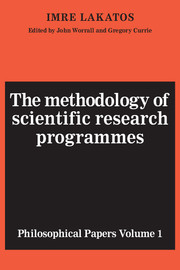Book contents
- Frontmatter
- Contents
- Editors' introduction
- Introduction: Science and pseudoscience
- 1 Falsification and the methodology of scientific research programmes
- 2 History of science and its rational reconstructions
- 3 Popper on demarcation and induction
- 4 Why did Copernicus's research programme supersede Ptolemy's?
- 5 Newton's effect on scientific standards
- References
- Lakatos bibliography
- Index of names
- Subject Index
Introduction: Science and pseudoscience
Published online by Cambridge University Press: 05 June 2012
- Frontmatter
- Contents
- Editors' introduction
- Introduction: Science and pseudoscience
- 1 Falsification and the methodology of scientific research programmes
- 2 History of science and its rational reconstructions
- 3 Popper on demarcation and induction
- 4 Why did Copernicus's research programme supersede Ptolemy's?
- 5 Newton's effect on scientific standards
- References
- Lakatos bibliography
- Index of names
- Subject Index
Summary
Man's respect for knowledge is one of his most peculiar characteristics. Knowledge in Latin is scientia, and science came to be the name of the most respectable kind of knowledge. But what distinguishes knowledge from superstition, ideology or pseudoscience? The Catholic Church excommunicated Copernicans, the Communist Party persecuted Mendelians on the ground that their doctrines were pseudoscientific. The demarcation between science and pseudoscience is not merely a problem of armchair philosophy: it is of vital social and political relevance.
Many philosophers have tried to solve the problem of demarcation in the following terms: a statement constitutes knowledge if sufficiently many people believe it sufficiently strongly. But the history of thought shows us that many people were totally committed to absurd beliefs. If the strength of beliefs were a hallmark of knowledge, we should have to rank some tales about demons, angels, devils, and of heaven and hell as knowledge. Scientists, on the other hand, are very sceptical even of their best theories. Newton's is the most powerful theory science has yet produced, but Newton himself never believed that bodies attract each other at a distance. So no degree of commitment to beliefs makes them knowledge. Indeed, the hallmark of scientific behaviour is a certain scepticism even towards one's most cherished theories. Blind commitment to a theory is not an intellectual virtue: it is an intellectual crime.
Information
- Type
- Chapter
- Information
- The Methodology of Scientific Research ProgrammesPhilosophical Papers, pp. 1 - 7Publisher: Cambridge University PressPrint publication year: 1978
Accessibility standard: Unknown
Why this information is here
This section outlines the accessibility features of this content - including support for screen readers, full keyboard navigation and high-contrast display options. This may not be relevant for you.Accessibility Information
- 19
- Cited by
